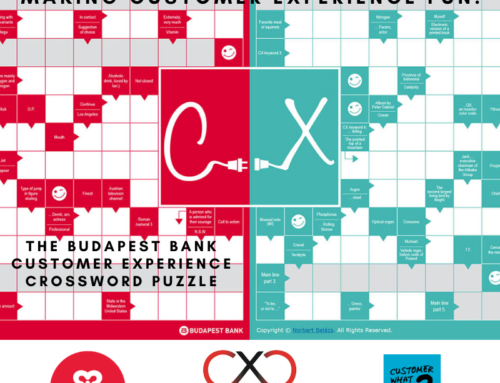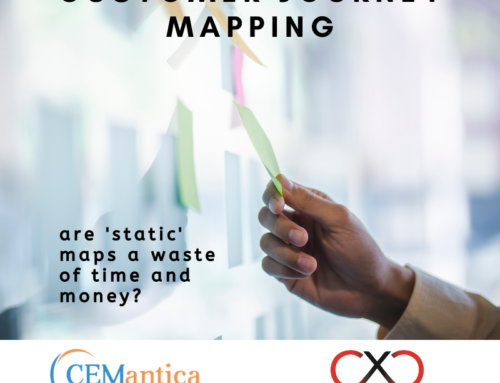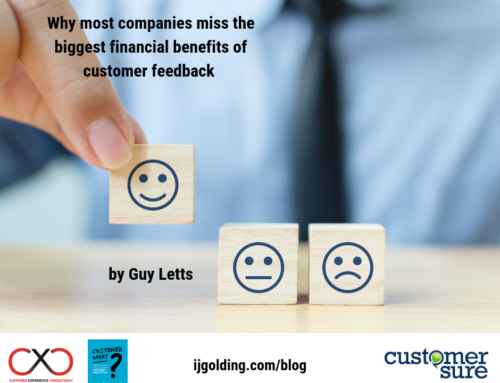
As we approach the end of another calendar year, like many Customer Experience Specialists, I am asked a number of ‘annual cyclical’ questions that ask for my opinion on a number of things. One of those things is related to my key Customer Experience learning’s for the year. I am not going to bore you with a list of everything that has struck me over the last 12 months, but I am going to focus on one thing in particular that has stood out for me – and that thing is best summed up by the word ‘education’!
If you have read my blog posts before, you will know that I am a fan of discovering the definition of words. One dictionary definition of ‘education’ is as follows:
A body of knowledge acquired while being educated
It is not complicated – although I remember from my school days that this very much depended on the subject being learned at the time!! We are all continuous acquirers of knowledge in the early stages of our lives. We learn how to read; we learn how to write; we learn how to add and subtract. Some of us learn a language, Some of us learn about our ancestors. We all get to a point where we choose to do one of two things – continue developing our educational knowledge, or to develop our knowledge by going out into the big wide world and ‘doing’.
The thing about education is that the knowledge we need to acquire CHANGES over time – as the world and the environment around us changes. When I was at school, ICT as a subject did not exist. In fact, Design & Technology was not something that was understood either – I do not feel as old as this, but when I was at school, I still attended ‘woodwork’ classes!!
When a concept is introduced to the world, it is necessary for schools, colleges, universities AND businesses to continue developing the knowledge of the people in their care so that they continue to acquire the skills that are necessary and required – for life and for the future. If you do not constantly and continuously develop everyone’s knowledge so that it is up to date and relevant, you will not be able to empower them to do what is expected…. or even what is right.

Customer Experience is a classic example of a subject that has arrived very late into the international world of business. As I always say, it is remarkably ironic that Customer Experience is considered a ‘new’ concept when organisations have been unconsciously delivering experiences since they were created!
However, until or unless people and organisations acknowledge and recognise the need to EDUCATE everyone in understanding what Customer Experience is AND how it should be delivered, consumers; customers all over the globe can continue to expect to receive ‘random’ or unintentional experiences!
What exactly do I mean? I mean that if businesses ASSUME that all of their employees (including those who make the decisions) actually understand what Customer Experience is and how best to design, improve and manage it, the experiences that customers expect to receive from the companies they interact with will do the following:
- Work better than hoped
- Work as intended
- Work sometimes
- Not work often enough
- Not work at all
There are other variants of these five options, but I am sure you get the point. Over the last twelve months, I have come to the conclusion that one of the greatest issues facing organisations of all shapes and sizes is the fact that there are too many who have insufficient KNOWLEDGE, EXPERTISE or COMPETENCE related to Customer Experience.
As I wrote recently, there are still a huge number of people who are yet to establish an understanding of the basic difference between Customer Service, Customer Experience and Customer Centricity. Whilst business leaders are talking more about these things (which is good), they also have to arm themselves and their people with the knowledge to know what to do with them! Although I am seeing an increase in ‘knowledge transfer’ activity, we are still scratching the surface of the commercial world.
Continuing education is and should be for everyone – from top to bottom. Leaders need to understand how to continually get better at leading people in the same way that front line employees need to develop and learn the very latest tools and techniques. Too often, I see a lack of development in people – not because they are not competent enough – but more down to an insufficient focus on continuing education.
Ask yourself the following questions:
- Is Customer Experience a part of our employee recruitment process?
- Are all employees introduced to our approach to Customer Experience during their induction?
- Have all existing employees been advised about the key elements of our approach to Customer Experience? (including brand purpose, customer metric(s), the experience the business wants its customers to have?)
- Have employees in Customer Experience related roles been given any specialist professional training (in Customer Experience strategy, design, culture, measurement etc..)?
- Have our leaders been trained in understanding how Customer Experience principles connect commercial goals to customer needs and expectations?
I could go on – but if the answer to any of these is NO, then there is a need for further EDUCATION on the subject of Customer Experience in your business.

The ‘random’ Customer Experience!
No hospital would let a doctor operate without sufficient skills. Your books cannot be audited by an unqualified accountant. You would not want to go to court with a rookie lawyer. So why do you entrust your Customer Experience with people who may not have the very latest tools, methods, knowledge and understanding? There is a role for academic institutions to play here – the majority continue to to teach traditional marketing and customer service skills yet are largely still to introduce Customer Experience to the curriculum in any way.
As we move into 2016, I very much hope that organisations start to invest in their Customer Experience. Not by throwing money at expensive consultants to create thousand slide long PowerPoint presentations – but by investing time and energy in educating their people – all of their people – so that they are better able to apply the tools and methodologies that can tangibly and demonstrably help to improve CUSTOMER PERCEPTION and as a result, COMMERCIAL PERFORMANCE!






Hi Ian
I wrote a post on Linkedin recently on how I saw brand, customer service, customer experience and insight relating to each other. I felt there is a learning loop involved. Not the same as education of people about customer experience, more an attempt to integrate different fields and disciplines around the idea of constantly learning about and responding to customers….this ultimately ensures evolving customer experiences.
Hope you find of interest.
Martin
https://www.linkedin.com/pulse/article/how-healthy-your-customer-centric-learning-loop-martin-silcock
Many thanks for sharing Martin – a great post that adds huge value to the conversation
May I just take the time to say Ian how much I look forward to reading your posts. It is such an incredible feeling to totally ‘feel’ the same way as an author. Everything you say resonates with me to my core. Keep them coming!
Thank you so much for such lovely words Debbie – it makes writing all the more pleasurable when I get feedback like this! Have a wonderful Christmas.